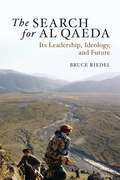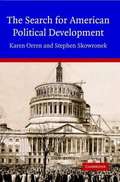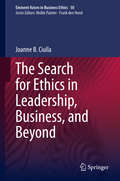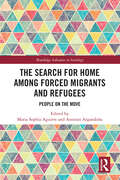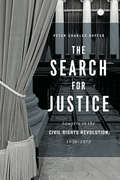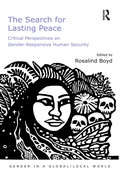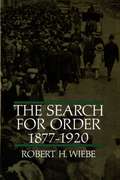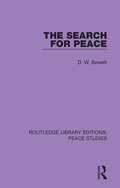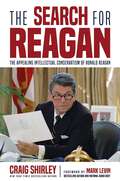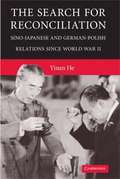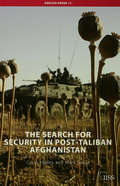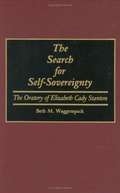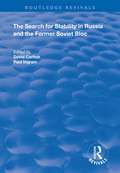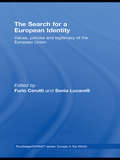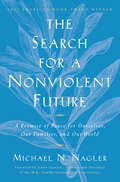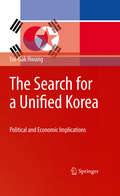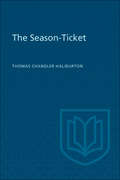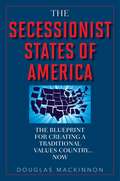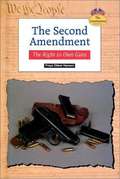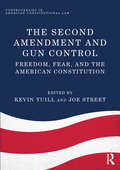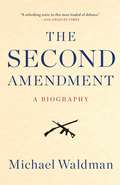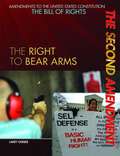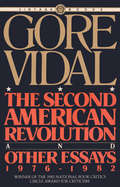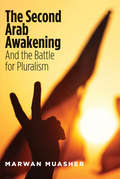- Table View
- List View
The Search for Al Qaeda
by Bruce RiedelAl Qaeda is the most dangerous terrorist movement in history. Yet most people in the West know very little about it, or their view is clouded by misperceptions and half truths. This widely acclaimed book fills this gap with a comprehensive analysis of al Qaeda-the origins, leadership, ideology, and strategy of the terrorist network that brought down the Twin Towers and continues to threaten us today.Bruce Riedel draws on decades of insider experience-he was actually in the White House during the September 11 attacks-in profiling the four most important figures in the al Qaeda movement: Usama bin Laden, ideologue and spokesman Ayman Zawahiri, former leader of al Qaeda in Iraq Abu Musaib al Zarqawi (killed in 2006), and Mullah Omar, its Taliban host. These profiles provide the base from which Riedel delivers a much clearer understanding of al Qaeda and its goals, as well as what must be done to counter and defeat this most dangerous menace.
The Search for American Political Development
by Karen Orren Stephen SkowronekThis book provides a justification for studying politics historically, not only for what it reveals about the roots of political affairs at the present time but what it teaches about politics as an ongoing activity. The authors survey past and current scholarship, attempting to outline a course of study for the future.
The Search for Efficiency in the Adjustment Process: Spain in the 1980s
by Augusto Lopez-ClarosA report from the International Monetary Fund.
The Search for Ethics in Leadership, Business, and Beyond (Issues in Business Ethics #50)
by Joanne B. CiullaThis book brings together a wide range of topics in leadership ethics and business ethics. It approaches these topics from the perspective of the humanities as well as the social sciences. About half of the book is on leadership and the other half on topics in business ethics. Besides these general areas of research, the book explores how to teach and study ethics in both business ethics and leadership studies. Specifically, it examines issues ranging from the nature of ethical leadership, to studies of authenticity, virtue, and the public and private morality of leaders. In business ethics, the subjects covered span from moral imagination, to casuistry, meaningful work, and workplace ethics. The book includes a section on the importance of liberal arts for studying and teaching ethics in business and professional schools. It concludes with a reflection on the ethical challenges of leaders and followers in a world where some leaders have inverted moral values.
The Search for Home among Forced Migrants and Refugees: People on the Move (Routledge Advances in Sociology)
by Antonio Argandoña Maria Sophia AguirreThis book explores the role of "home" in the lives of displaced people, including voluntary and forced migrants, refugees, asylum seekers, internally displaced people and temporary workers. For displaced people, home is something lost, longed for and sometimes found anew. It is a community of people in an environment of relationships and a physical dwelling that provide a sense of safety, security, hope and belonging. Much of the efforts of refugees, migrants and exiles are devoted to rebuilding a home, through a combination of personal effort and collaboration with the political and social environment of the host community. Maria Sophia Aguirre and Antonio Argandoña bring together an interdisciplinary collection of contributors to analyse these challenges through the lenses of economics, law, sociology, psychology, communications, management and political science. The book offers numerous suggestions for assistance aimed not only at the short-term problems of displaced people but also at ensuring their human dignity. This volume will be a valuable resource for students and scholars of the sociology of migration and of public policy related to the handling of migrants.
The Search for Justice: Lawyers in the Civil Rights Revolution, 1950–1975
by Peter CharlesThe civil rights era was a time of pervasive change in American political and social life. Among the decisive forces driving change were lawyers, who wielded the power of law to resolve competing concepts of order and equality and, in the end, to hold out the promise of a new and better nation. The Search for Justice is a look the role of the lawyers throughout the period, focusing on one of the central issues of the time: school segregation. The most notable participants to address this issue were the public interest lawyers of the NAACP’s Legal Defense Fund, whose counselors brought lawsuits and carried out appeals in state and federal courts over the course of twenty years. But also playing a part in the story were members of the bar who defended Jim Crow laws explicitly or implicitly and, in some cases, also served in state or federal government; lawyers who sat on state and federal benches and heard civil rights cases; and, finally, law professors who analyzed the reasoning of the courts in classrooms and public forums removed from the fray. With rich, copiously researched detail, Hoffer takes readers through the interactions of these groups, setting their activities not only in the context of the civil rights movement but also of their full political and legal legacies, including the growth of corporate private legal practice after World War II and the expansion of the role of law professors in public discourse, particularly with the New Deal. Seeing the civil rights era through the lens of law enables us to understand for the first time the many ways in which lawyers affected the course and outcome of the movement.
The Search for Lasting Peace: Critical Perspectives on Gender-Responsive Human Security (Gender in a Global/Local World)
by Rosalind BoydPresenting the human security agenda as a policy response to the changing nature of violent conflicts and war, this collection traces its evolution in relation to conflicts in different contexts (Burma, India, Palestine, Canada, East Timor, Guatemala, Peru and African countries) and from the perspective of gender, addresses initiatives for peace with justice. Cases are analysed when the human security agenda, including UNSC resolution 1325, was in its initial phase and point to both the weakness of the concept and the unexpected direction it has taken. These discussions - always relevant - are more urgent than ever as gender-based violence against women has increased, resulting in new UNSC resolutions. Some chapters suggest that militarism and economic globalization must be directly confronted. Many of the contributors to the volume bridge the gap between academic research and activism as ’scholar-activists’ with an engaged connection to the situations they are describing. Human security remains an active component of policy and academic debates in security studies, women’s and gender studies, development studies, history and political economy as well as within NGO communities. This rich collection fills a needed gap in the literature and it does so in a language and style that is clear, accessible and reader-friendly.
The Search for Order 1877-1920
by Robert H. WiebeAmericans sought the organising principles around which a new viable social order could be constructed in the modern world. This subtle and sophisticated study combines the virtues of historical narrative, sociological analysis, and social criticism.
The Search for Peace (Routledge Library Editions: Peace Studies)
by D. W. BowettUsing authoritative extracts from the relevant and important sources at the time, this volume, originally published in 1972, deals with the problems and difficulties of maintaining peace in the world. The control of the use of force remains the most intractable, and yet the most important, problem in international relations. Although the antagonists change, antagonism appears to be almost an inherent feature of inter-state relations and although global conflict has been avoided for the past quarter of a century, the risk is always present. The cost of such anarchy in international relations, measured in terms of human suffering and wastage of resources, is appalling. In this book, Dr Bowett looks at the need for peaceful settlement of international disputes, the peacekeeping role of the United Nations, aid to developing countries and disarmament, and suggests that the structure of international society based on the Sovereign State could be modified to lessen the risk of conflict. The extracts include statements by Khrushchev, Mao Tse-Tung, Che Guevara, Dag Hammarskjöld, U Thant, Ho Chi-Minh, and selections from many national and international documents.
The Search for Reagan: The Appealing Intellectual Conservatism of Ronald Reagan
by Craig ShirleyNever before has anyone explored the mind, soul, and heart of Ronald Reagan. The Search for Reagan explores the challenges and controversies in Reagan&’s life and how he successfully dealt with each, depicting a man who was never as conservative as some conservatives wanted him to be, but rather as conservative as he was comfortable being—a man who wanted to win on his own terms and integrity.Ronald Reagan was a singularly unique man and conservative who championed a wildly successful revolution—leading to more freedom and less government for the American people and to the fall of communism, while boosting American morale, which had been his three big goals. He was the first president in many years who believed optimism from the Oval Office had a direct bearing on the affairs of the nation. As a consequence, he left office more popular than when he entered with a whopping 73 percent approval. He is beloved even today as his presidential library is visited far more than any other presidential library, by more than five million people each year. He understood that American conservatism was based upon the individual and not the group. He is still regarded as one of the most admired men in America. The range of Reagan scholarship by virtue of books sold about him continues to grow. In his presidency, he solved the mystery of high inflation that had bedeviled his predecessor, high interest rates, and high gas prices. He created over twenty million new jobs, and the number of American millionares grew from 4,414 to 34,944. He quite literally changed our world for the better and is considered by most historians to be one of our four greatest presidents, along with George Washington, Abraham Lincoln, and Franklin Roosevelt.
The Search for Reconciliation
by Yinan HeWhy have some former enemy countries established durable peace while others remain mired in animosity? When and how does historical memory matter in post-conflict interstate relations? Focusing on two case studies, Yinan He argues that the key to interstate reconciliation is the harmonization of national memories. Conversely, memory divergence resulting from national mythmaking harms long-term prospects for reconciliation. After WWII, Sino-Japanese and West German-Polish relations were both antagonized by the Cold War structure, and pernicious myths prevailed in national collective memory. In the 1970s, China and Japan brushed aside historical legacy for immediate diplomatic normalization. But the progress of reconciliation was soon impeded from the 1980s by elite mythmaking practices that stressed historical animosities. In contrast, from the 1970s West Germany and Poland began to de-mythify war history and narrowed their memory gap through restitution measures and textbook cooperation, paving the way for significant progress toward reconciliation after the Cold War.
The Search for Security in Post-Taliban Afghanistan (Adelphi series)
by Mark Sedra Cyrus HodesBy the middle of 2007, Afghans had become increasingly disillusioned with a state-building process that had failed to deliver the peace dividend that they were promised. For many Afghans, the most noticeable change in their lives since the fall of the Taliban has been an acute deterioration in security conditions. Whether it is predatory warlords, the Taliban-led insurgency, the burgeoning narcotics trade or general criminality, the threats to the security and stability of Afghanistan are manifold. The response to those threats, both in terms of the international military intervention and the donor-supported process to rebuild the security architecture of the Afghan state, known as security-sector reform (SSR), has been largely insufficient to address the task at hand. NATO has struggled to find the troops and equipment it requires to complete its Afghan mission and the SSR process, from its outset, has been severely under-resourced and poorly directed. Compounding these problems, rampant corruption and factionalism in the Afghan government, particularly in the security institutions, have served as major impediments to reform and a driver of insecurity. This paper charts the evolution of the security environment in Afghanistan since the fall of the Taliban, assessing both the causes of insecurity and the responses to them. Through this analysis, it offers some suggestions on how to tackle Afghanistan’s growing security crisis.
The Search for Self-Sovereignty: The Oratory of Elizabeth Cady Stanton
by Beth M. WaggenspackThis book is divided into two major sections. The first is a summary of the life and times of the pioneering women's-rights advocate Elizabeth Cady Stanton with an analysis of several of her most important speeches. The second section reprints some representative speeches in full.
The Search for Stability in Russia and the Former Soviet Bloc (Routledge Revivals)
by David Carlton Ingram PaulFirst published in 1997, this volume consists of chapters placed before a series of meetings organised by the Rome-based international School on Disarmament and Research on Conflicts (ISODARCO) which reviewed the prospects relating to the countries of the Former Soviet Union and of the other members of the Warsaw Treaty Organization. The authors include Western experts, as well as distinguished commentators from Russia itself. Among the latter are Georgi Arbatov, Ruslan Khasbulatov and Alexei Arbatov. An earlier volume of chapters deriving from this same series of meetings was still in print at the time of original publication in 1997, namely Rising Tension in Eastern Europe and the Former Soviet Union.
The Search for a European Identity: Values, Policies and Legitimacy of the European Union (Routledge/GARNET series)
by Furio Cerutti Sonia LucarelliThis book examines the link between political identity and legitimacy in the European Union. Stimulated by the crisis of legitimacy and identity suffered by the EU after the referenda on the Constitutional Treaty, the editors have developed a theoretical framework to examine the interplay between these two items in the problematic development of the EU into a fully-fledged political actor. The contributors to the volume seek to: Redefine the key notions in the rigorous way of political philosophy, thus avoiding the generic or imprecise language usage found in a large part of political science literature on identity Test these concepts in the analysis of EU policies that may reveal the world views and the principles upon which EU legislation is based, and whose degree of acceptance on the side of the citizens is an indicator of how far a shared political identity has developed. Featuring case studies on foreign and environmental policy, biosafety policy, biotechnology regulation, civil society, human rights promotion, as well as studies on the role of memory, space and external views on the process of European identity-building, this book will be of interest to students and researchers of political science, political philosophy, European politics and European Studies.
The Search for a Nonviolent Future: A Promise of Peace for Ourselves, Our Families, and Our World
by Michael N. NaglerBeginning with the achievements of Mahatma Gandhi, and following the legacy of nonviolence through the struggles against Nazism in Europe, racism in America, oppression in China and Latin America, and ethnic conflicts in Africa and Bosnia, Michael Nagler unveils a hidden history. Nonviolence, he proposes, has proven its power against arms and social injustice wherever it has been correctly understood and applied. Nagler's approach is not only historical but also spiritual, drawing on the experience of Gandhi and other activists and teachers. Individual chapters include A Way Out of Hell, The Sweet Sound of Order, and A Clear Picture of Peace. The last chapter includes a five-point blueprint for change and "study circle" guide. The foreword by Arun Gandhi, the grandson of Mahatma Gandhi, is new to this edition.
The Search for a Unified Korea
by Eui-Gak HwangWith the leadership of the North Korean political regime in flux, the political and economic relationship between North Korea and South Korea, and between the Korean peninsula and the world, is uncertain. What would be the implications if the current North Korean government were to fall? This timely book provides a thorough analysis of the complexities of regime change that goes far beyond the usual media discussion of this topic. The book traces the historical roots of the existence of the two Koreas and their ideological divide. It goes on to review the consequences of South Korea's alternating policies of "sternness and sunshine" toward North Korea since World War II, and presents an analysis of their likely relative efficacy in achieving re-unification. The book then examines the effect of international affairs on the prospects for stability and reunification on the Korean peninsula and assesses the relevance of reunification experiences in Germany and Vietnam to Korea's situation. Finally, it suggests how to proceed if the opportunity for reunification arises, tackling the issue of how South Korea can respond to other nations' interests in the outcome on the Korean Peninsula and the need for a multinational body to supervise a North Korean transition replacing the present regime. This comprehensive book will be invaluable to any researcher, student, or decision maker interested in the future of the Korean peninsula, East Asian political economy, and international diplomacy.
The Season-Ticket
by Douglas Lochhead Thomas HaliburtonThe Season-Ticket, published in 1860, is made up of a series of articles previously contributed during 1859 and 1860 to the Dublin University Magazine. Its quality of interest lies in its major purpose: the programme of a thorough going British imperialist who advocates “a three-fold policy for developing intercommunication between the motherland and the colonies.” In this work, Haliburton proposed that Great Britain subsidize transatlantic steamers between its ports and the colonies, complete the Intercolonial Railway and continue it to Lake Superior, and provide a “safe, easy, and expeditious route to Fraser’s River on the Pacific.” Haliburton further argues for the substitution of a permanent colonial council of appointees from the colonies in place of the Colonial Office, and he raises the possibility of colonial representation in the British parliament.
The Secessionist States of America: The Blueprint for Creating a Traditional Values Country . . . Now
by Douglas MackinnonMillions of American families from every race, creed, and economic background are losing hope as the United States continues slide deeper into fiscal insanity and moral decay. Where will America stand when we lose our traditional values, border security, and limited government?Having gained insight from industry experts in farming, energy, infrastructure, and finance, author Douglas MacKinnon has outlined one alternative to our existing government in an entirely constitutional and legal approach-secession from the United States of America.President Abraham Lincoln once said, "This country, with its institutions, belongs to the people who inhabit it. Whenever they shall grow weary of the existing government, they can exercise their constitutional right of amending it, or their revolutionary right to dismember or overthrow it." With this patriotic wisdom of Abraham Lincoln and Thomas Jefferson in mind, MacKinnon also works in conjunction with a team of highly experienced individuals from Special-Ops, intelligence, the military, and constitutional law to provide you with the answers to why, how, when, and where as he outlines what secessionism would bring.Using maps, charts, and excerpts of previously published materials to supplement his own interviews and research, MacKinnon has written a powerful, one-of-a-kind book that will initiate conversation-and movement-throughout the country.
The Second Amendment
by Freya Ottem HansonPresents an overview of the Second Amendment of the United States Constitution and examines the debate that has surrounded the right to bear arms.
The Second Amendment and Gun Control: Freedom, Fear, and the American Constitution (Controversies in American Constitutional Law)
by Kevin Yuill Joe StreetThe Second Amendment, by far the most controversial amendment to the US Constitution, will soon celebrate its 225th anniversary. Yet, despite the amount of ink spilled over this controversy, the debate continues on into the 21st century. Initially written with a view towards protecting the nascent nation from more powerful enemies and preventing the tyranny experienced during the final years of British rule, the Second Amendment has since become central to discussions about the balance between security and freedom. It features in election contests and informs cultural discussions about race and gender. This book seeks to broaden the discussion. It situates discussion about gun controls within contemporary debates about citizenship, culture, philosophy and foreign policy as well as in the more familiar terrain of politics and history. It features experts on the Constitution as well as chapters discussing the symbolic importance of Annie Oakley, the role of firearms in race, and filmic representations of armed Hispanic girl gangs. It asks about the morality of gun controls and of not imposing them. The collection presents a balanced view between those who favour more gun controls and those who would prefer fewer of them. It is infused with the belief that through honest and open debate the often bitter cultural divide on the Second Amendment can be overcome and real progress made. It contains a diverse range of perspectives including, uniquely, a European perspective on this most American of issues.
The Second Amendment: A Biography
by Michael Waldman<P>By the president of the prestigious Brennan Center for Justice at NYU School of Law, the life story of the most controversial, volatile, misunderstood provision of the Bill of Rights. <P>At a time of renewed debate over guns in America, what does the Second Amendment mean? This book looks at history to provide some surprising, illuminating answers. <P>The Amendment was written to calm public fear that the new national government would crush the state militias made up of all (white) adult men--who were required to own a gun to serve. Waldman recounts the raucous public debate that has surrounded the amendment from its inception to the present. As the country spread to the Western frontier, violence spread too. But through it all, gun control was abundant. <P>In the 20th century, with Prohibition and gangsterism, the first federal control laws were passed. In all four separate times the Supreme Court ruled against a constitutional right to own a gun.The present debate picked up in the 1970s--part of a backlash to the liberal 1960s and a resurgence of libertarianism. A newly radicalized NRA entered the campaign to oppose gun control and elevate the status of an obscure constitutional provision. In 2008, in a case that reached the Court after a focused drive by conservative lawyers, the US Supreme Court ruled for the first time that the Constitution protects an individual right to gun ownership. Famous for his theory of "originalism," Justice Antonin Scalia twisted it in this instance to base his argument on contemporary conditions. <P>In The Second Amendment: A Biography, Michael Waldman shows that our view of the amendment is set, at each stage, not by a pristine constitutional text, but by the push and pull, the rough and tumble of political advocacy and public agitation.
The Second Amendment: The Right To Bear Arms (Amendments To The United States Constitution: The Bill Of Rights)
by Larry GerberThe United States has the most guns per capita of any country in the world. Many Americans value the right to bear arms, which they believe is guaranteed by the Second Amendment to the Constitution. Others believe that the Second Amendment only guarantees the right for organized militias to own guns. This book surveys the history of the Second Amendment and gun ownership in the United States, and explores how the amendment continues to affect us today.
The Second American Revolution and Other Essays 1976 - 1982: And Other Essays, 1976-1982
by Gore VidalThese nineteen essays richly confirm Gore Vidal's reputation as "America's finest essayist" (The New Statesman), and are further evidence of the breadth and depth of his intelligence and wit. Included here are his highly praised essays on Theodore Roosevelt ("An American Sissy"), F. Scott Fitzgerald, Edmund Wilson ("This Critic and This Gin and These Shoes"), the need for a new constitutional convention—as well as his controversial study of relations between the homosexual and Jewish communities ("Pink Triangle and Yellow Star"). Vidal's other subjects range from Christopher Isherwood to L. Frank Baum ("The OZ BOoks"), from the question of "Who Makes the Movies?" to the misadventures—religious and financial—of Bert Lance.
The Second Arab Awakening
by Marwan MuasherThis important book is not about immediate events or policies or responses to the Arab Spring. Instead, it takes a long, judicious view of political change in the Arab world, beginning with the first Awakening in the nineteenth century and extending into future decades when-if the dream is realized-a new Arab world defined by pluralism and tolerance will emerge. Marwan Muasher, former foreign minister of Jordan, asserts that all sides-the United States, Europe, Israel, and Arab governments alike-were deeply misguided in their thinking about Arab politics and society when the turmoil of the Arab Spring erupted. He explains the causes of the unrest, tracing them back to the first Arab Awakening, and warns of the forces today that threaten the success of the Second Arab Awakening, ignited in December 2010. Hope rests with the new generation and its commitment to tolerance, diversity, the peaceful rotation of power, and inclusive economic growth, Muasher maintains. He calls on the West to rethink political Islam and the Arab-Israeli conflict, and he discusses steps all parties can take to encourage positive state-building in the freshly unsettled Arab world.
